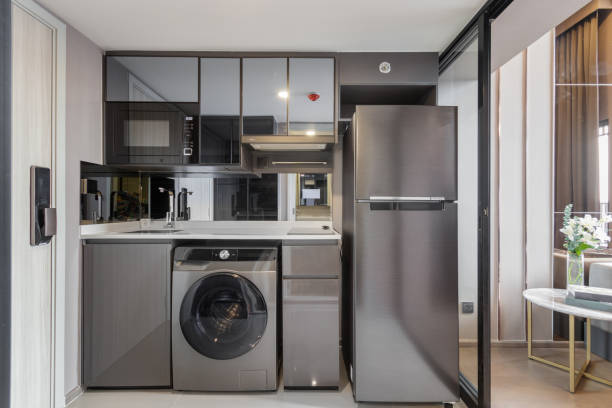Household appliances can be our best friends—until they start causing trouble. Whether it’s your refrigerator suddenly deciding it doesn’t want to keep things cold anymore or your washer turning every wash into a mini-flood, knowing when to replace your appliances can save you headaches, time, and money.
In this guide, we’ll walk you through how to recognize the signs that it might be time for an upgrade, choose the right replacements, and even help you understand the environmental benefits of modern, energy-efficient models.
Importance of Household Appliances and Their Lifespan
Homeowners rely on their household appliances for daily convenience and comfort. These machines help us manage our chores and streamline our routines, making our lives significantly easier. Yet, like all things, appliances have a lifespan, and knowing when it’s time to say goodbye can be tricky.
Most major appliances, such as refrigerators, washing machines, and ovens, have an average lifespan of 10-15 years. However, this can vary based on usage, maintenance, and quality. Recognizing when an appliance is nearing the end of its useful life can save you from sudden breakdowns and the hassle of emergency replacements.
Signs It’s Time to Replace an Appliance
High Energy Bills
If your energy bills have been steadily climbing, your old appliances could be to blame. Older units often consume more electricity due to outdated technology and wear and tear. In particular, air conditioners, refrigerators, and water heaters are notorious for driving up utility costs as they age. Monitoring your energy consumption can give you a clue about which appliances might need replacing.
Frequent Repairs
Are you calling the repairman more often than you’d like? Frequent repairs indicate that your appliance is struggling to function properly. While minor fixes are normal, repeatedly shelling out for major repairs is a clear sign that replacement might be the better financial decision. Instead of sinking money into a failing machine, consider investing in a new, more reliable model.
Age of the Appliance
Age isn’t just a number, especially when it comes to appliances. Different appliances have different expected lifespans. For example:
- Refrigerators typically last about 10-12 years.
- Washing machines can go for around 10 years.
- Dishwashers usually last about 9-10 years.
- Ovens can serve you for about 15 years.
If your appliance is approaching or exceeding these timelines, it’s wise to start looking for a replacement, even if it’s still functioning. This proactive approach can help you avoid the inconvenience of a sudden breakdown.
How to Choose the Right Replacement
Research the Latest Models
When you’ve decided it’s time for a new appliance, it’s crucial to do your homework. Start by researching the latest models and reading reviews from other homeowners. Look for appliances that offer the features you need and have positive feedback regarding performance and durability.
Consider Energy Efficiency
Choosing energy-efficient appliances is not only good for your wallet but also for the environment. Look for the ENERGY STAR label, which signifies that the appliance meets stringent energy efficiency guidelines. Energy-efficient models consume less electricity and water, leading to significant savings on your utility bills over time.
Compare Prices and Warranty Options
Before making a final decision, it’s wise to compare prices across various retailers, both online and in-store. Consider looking into specific deals on major appliances, as many retailers offer seasonal discounts. Additionally, pay attention to warranty options available for each model. A good warranty can save you significant costs on repairs down the line and provide peace of mind.
If you’re in specific areas like Kaysville, UT, and you’re looking for AC replacement, make sure to factor in local HVAC service companies that can guide you through the process of selecting an energy-efficient model tailored to your needs. It’s always beneficial to consult with local experts to understand which systems work best in your area’s climate and how they can contribute to lower energy bills.
Tips for Proper Maintenance to Prolong Appliance Lifespan
Regular Cleaning and Inspections
Regular maintenance can significantly extend the lifespan of your appliances. Simple tasks like cleaning filters, vacuuming refrigerator coils, and descaling your coffee maker can make a big difference. Set reminders to perform these routine checks and cleans, ensuring your appliances run smoothly for years to come.
Following Manufacturer’s Guidelines
Always follow the manufacturer’s guidelines for use and maintenance. These instructions are designed to help you get the most out of your appliance while ensuring safety and efficiency. Ignoring these recommendations can lead to premature wear and tear, reducing the overall lifespan of your machine.
The Environmental Impact of Replacing Appliances
The Benefits of Energy-Efficient Models
Switching to energy-efficient appliances has a positive impact on the environment. These models use less energy and water, reducing your carbon footprint. Over time, the cumulative effect of households making the switch can lead to significant environmental benefits. Plus, energy-efficient appliances often come with rebates or incentives, making them a cost-effective choice.
Proper Disposal of Old Appliances
When replacing your appliances, it’s essential to dispose of the old ones responsibly. Many components of appliances can be recycled, reducing landfill waste and conserving resources. Check with your local waste management services for proper disposal and recycling options.
Conclusion
Recognizing when it’s time to replace your appliances can save you from unexpected breakdowns and high repair costs. By understanding the signs of aging appliances, doing thorough research for replacements, and considering energy efficiency, you can make informed decisions that benefit both your home and the environment. Regular maintenance can also prolong the life of your new appliances, ensuring you get the most out of your investment.
For homeowners looking to maintain a smooth and efficient household, proactive appliance management is key. Start inspecting your appliances today and make a plan for timely replacements.

